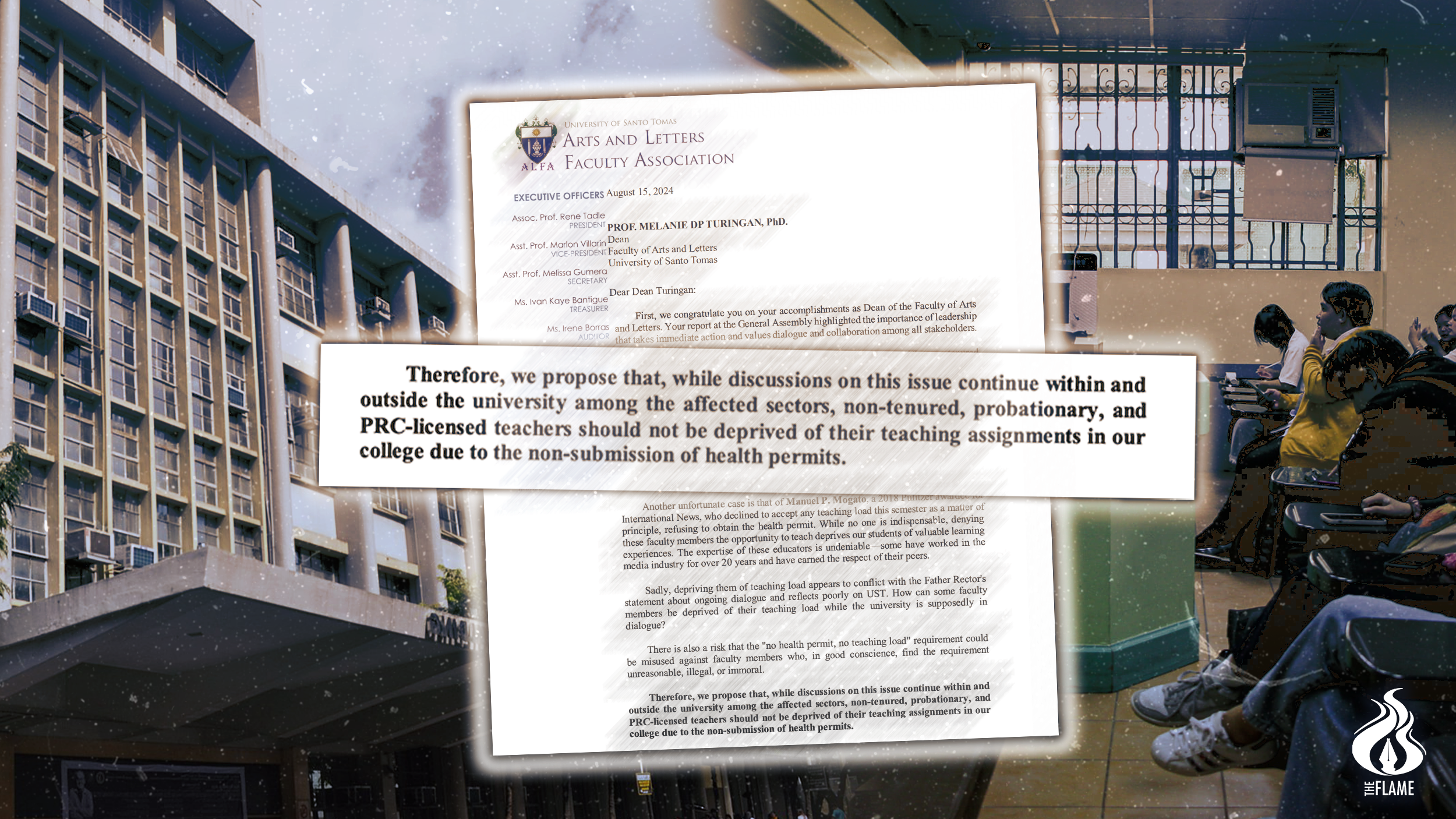
THE UST Arts and Letters Faculty Association (ALFA) has urged the Artlets dean to allow teachers who have not complied with the Manila health permit policy to receive teaching loads while the issue is still developing, saying the sanction imposed by the University lacked fairness.
In a letter to Artlets Dean Prof. Melanie Turingan dated Aug. 15, ALFA appealed for the reinstatement of some faculty members in the college after several of them were not granted appointment letters for the first term of the new academic year.
According to the group, barring non-compliant instructors from teaching contradicts UST’s statement last Aug. 7, when it vowed to “meet the requirements of the laws and policies of regulatory agencies” while holding dialogues with stakeholders.
“[W]e propose that, while discussions on this issue continue within and outside the University among the affected sectors, non-tenured, probationary, and PRC-licensed teachers should not be deprived of their teaching assignments in our college due to the non-submission of health permits,” the letter, a copy of which was obtained by The Flame, read.
Under Ordinance 8793 issued in 2021, which was disseminated to UST employees through a memorandum in April, workers must pay P625 to renew their health permit annually. To secure the permit, they must submit a valid ID, stool and urine samples, a filled-out drug test form and biometrics. Since its implementation, the ordinance has elicited criticisms from workers who scored its costly medical procedures and unhygienic testing site and who described it as an extortion scheme.
Some UST instructors told The Flame that the warning about the termination of non-tenured employees without a sanitary permit was released in late June, two months after the directive was issued. They said the supposed delayed notice has left them with “insufficient” time to raise their grievances or prepare contingency plans.
The faculty association also argued that some instructors were only told they would not receive teaching loads over their non-compliance with the Manila health permit policy two days before the start of classes.
“There is also a risk that the ‘no health permit, no teaching load’ requirement could be misused against faculty members who, in good conscience, find the requirement unreasonable, illegal, or immoral,” the group added.
‘Confusion,’ ‘discrimination’
Also included in the city-wide policy’s provision is that practicing professionals have the option to pay for a professional tax receipt instead of a health certificate, in accordance with the Local Government Code, which takes precedence over the ordinance, according to the April memorandum.
This means the code determines the capacity of the city of Manila to impose ordinances and any provision not in line with the code may be deemed invalid.
The faculty association noted that the code does not indicate an alternative for licensed professionals to opt for a professional tax instead of a health permit, saying the exemption has caused “confusion” and a “strong feeling of discrimination” against part-time lecturers.
“Making such a distinction and applying it as policy is inconsistent with the purpose of the ordinance, which requires health permits to ensure that workers are fit for work and free of communicable diseases—something that cannot be guaranteed solely by holding a professional license,” ALFA said.
When the term began, the health permit was included in the list of documents that non-tenured faculty members must submit to obtain a teaching appointment. Meanwhile, tenured faculty members were still given teaching loads even if they did not comply with the requirement because the law states that regular employees cannot be dismissed unless there is a just cause to do so.
The vacant teaching loads of the non-tenured teachers were reassigned to regular faculty members or those who had health permits or professional licenses. Some class schedules have also been disrupted at the start of the new academic year because some courses were left with no instructors.
READ: UST faculty members lose teaching load over non-compliance with health permit policy
In its letter, the faculty association sought equal treatment of non-tenured and licensed professional faculty members, criticizing the sanction to bar non-compliant lecturers from teaching.
“Non-tenured faculty members who have not submitted the health permit should be treated the same as PRC/IBP-licensed [Professional Regulation Commission/Integrated Bar of the Philippines] and tenured faculty. If we do not deprive the latter of teaching loads, fairness demands that the same consideration be given to non-tenured faculty members,” ALFA stated.
The Artlets faculty association reiterated the request of other labor groups in the University to use the UST health facilities for the collection and testing of specimens since the ordinance mandates that all examinations be done in government-owned laboratories or those officially recognized by the Manila Health Department.
Citing the current collective bargaining agreement between the University administration and its staff, ALFA argued that the examinations required to secure a health permit should be provided to employees for free.
“This means our faculty members do not need to pay for or be exposed to substandard health facilities provided by the city of Manila. Unfortunately, it is unclear to us whether this option was even explored or discussed in the June 26 meeting [with Manila City Health Officer Dr. Arnold “Poks” Pangan], as no union representatives were invited,” it said.
ALFA also questioned the ordinance’s citation of Presidential Decree (PD) 856, which only requires workers in food establishments to secure sanitary permits. The union claimed that Pangan had incorrectly attributed the source of the provision to PD 856 when it is actually from a document on implementing rules and regulations from the Department of Health.
“Obviously, if there is a conflict between PD 856 and an IRR from the Department of Health, the former prevails,” it added.
The faculty group said UST must be able to “challenge” local ordinances that may harm its workers without sacrificing their working conditions, rights and welfare.
“Lastly, while we understand that as Dean of our beloved Faculty, your office is bound by the directives of the OVRAA, we firmly believe that, as a fellow faculty member, you can empathize with us and our displaced colleagues. We urge you to echo these sentiments on our behalf,” ALFA said.
“Considering UST’s 40,000 students, it is unlikely that the City of Manila would close the university for non-compliance with local ordinances, given the social consequences. UST has the resources to challenge any ordinances or requirements it deems abusive or beyond the authority of the local government.”
ALFA said a dialogue between Organisasyon ng Nagkakaisang Empleyado-UST (ONE-UST), a coalition of three labor groups in the University, and the UST Rector would be crucial in boosting the morale of workers in the University and protecting its reputation. So far, the rector has yet to issue a notice to the coalition about the meeting. F — with reports from Ma. Alyanna Selda




[…] READ: Let non-compliant members teach pending talks on health permit policy, AB dean urged […]